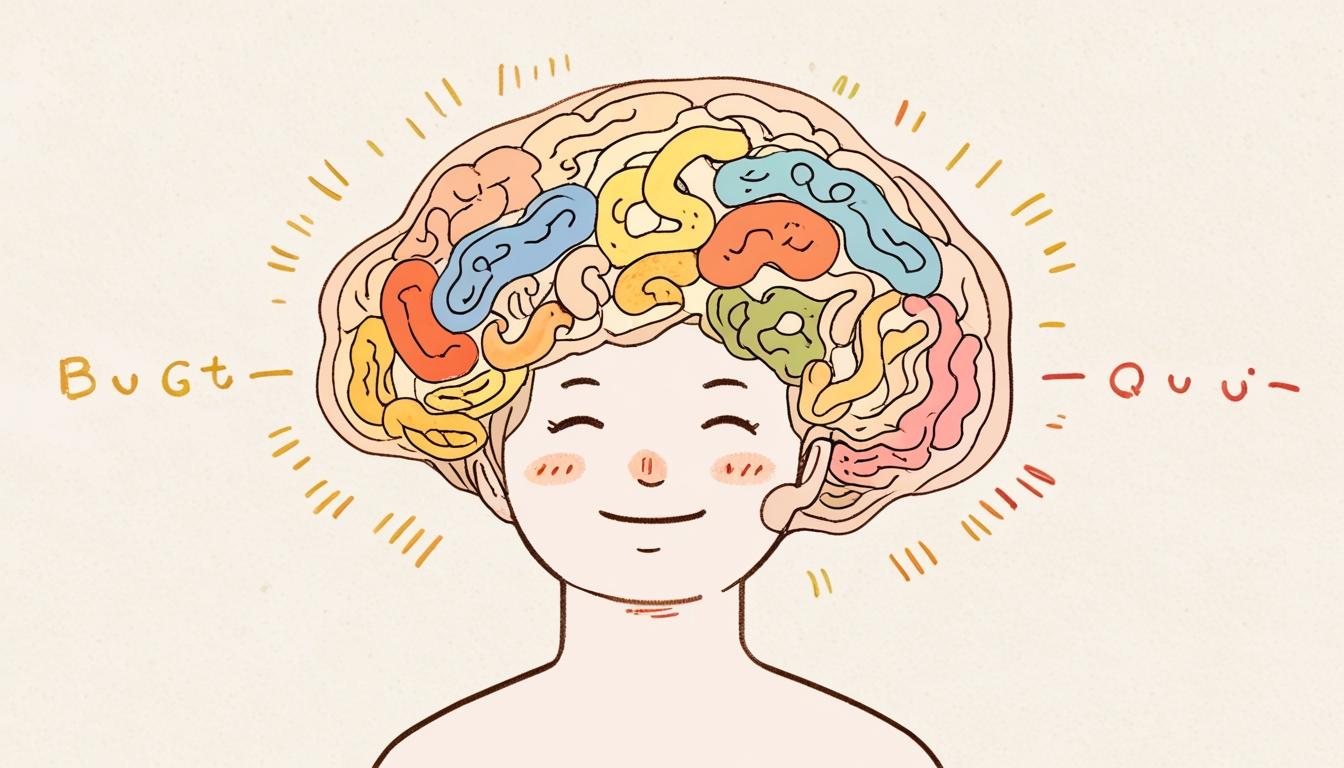New research highlights how daily probiotics can alleviate negative emotions such as anxiety and fatigue by modulating the gut-brain connection, offering complementary support for mental well-being alongside traditional treatments.
Probiotics: Emerging Allies in Managing Negative Emotions
In recent years, the intricate connection between gut health and mental well-being has captivated researchers and health enthusiasts alike. The notion that our gut microbiome might significantly influence our emotions is gaining traction, with probiotics—beneficial microorganisms commonly found in fermented foods—emerging as potential allies in managing negative feelings.
Recent research underscores this evolving understanding. A study led by Katerina Johnson and Laura Steenbergen, published in npj Mental Health Research, revealed that daily probiotic consumption was linked to notable reductions in anxiety, stress, and fatigue among participants. Those taking probiotics reported a marked improvement in their emotional states, beginning approximately two weeks into the study. Such findings align with a broader narrative suggesting that dietary choices can significantly affect mental health, with nutrient-dense foods playing a crucial role in enhancing cognitive function and mood.
Central to this discussion is the gut-brain axis, a bidirectional communication network connecting the gastrointestinal system and the central nervous system. Probiotics can modulate this axis by influencing neurotransmitter production—such as serotonin and GABA—regulating immune responses, and reducing inflammation, all of which contribute to mood and emotional stability. The presence of these beneficial microorganisms can create a more balanced internal environment, potentially leading to improved mental health outcomes.
The identification of specific groups who may benefit most from probiotics is of particular interest. The aforementioned study indicated that individuals with heightened levels of negative emotions at baseline displayed the most considerable improvements when supplemented with probiotics. This suggests that those experiencing mild to moderate anxiety or depressive symptoms might find probiotics especially beneficial in their emotional journey towards better mental health.
Incorporating probiotics into daily routines can be straightforward and enjoyable. Beyond supplements, these microorganisms are also prevalent in fermented foods like yogurt, kefir, sauerkraut, and kimchi. By integrating such foods into a regular diet, individuals could take pragmatic steps towards enhancing their emotional resilience. While probiotics show promise, it is crucial to recognise that they do not supplant conventional treatments for mental health conditions. Instead, they should be viewed as complementary tools within a broader therapeutic strategy.
Research from McMaster University corroborates these findings, indicating that probiotics may alleviate symptoms of both irritable bowel syndrome (IBS) and associated mental ailments like depression. In a placebo-controlled trial involving adults suffering from IBS, those receiving the probiotic Bifidobacterium longum reported a higher reduction in depressive symptoms compared to the placebo group, reinforcing the potential benefits of probiotics.
Moreover, studies suggest that multi-strain probiotics, which combine various bacterial species, may be more effective than single strains in addressing anxiety and depression. This variance in efficacy highlights the importance of the specific types and combinations of probiotic strains, as well as their origins, in determining their overall impact on mental health.
The implications of these findings extend beyond the realm of probiotics alone. The broader dietary landscape also plays a pivotal role in mental well-being, as nutrient-dense diets—such as the Mediterranean diet—have been linked to lower risks of depression. These diets, rich in fruits, vegetables, legumes, and healthy fats, nourish gut microbes and subsequently support cognitive health.
In the context of emotional distress, such as grief, the health of the gut microbiome can be compromised. Stress can activate the sympathetic nervous system, disrupting digestion and altering the microbiome balance. Notably, techniques like yoga and mindful meditation can further complement dietary changes, fostering a holistic approach to mental health.
In conclusion, emerging evidence suggests that probiotics could play a vital role in managing negative emotions and supporting emotional well-being. As ongoing research delves deeper into the gut-brain connection, there is considerable hope that these microorganisms will be effectively woven into the tapestry of mental health strategies, offering new pathways for those seeking relief from anxiety and emotional distress.
Reference Map
Paragraph 1: 1, 2
Paragraph 2: 1
Paragraph 3: 1, 5
Paragraph 4: 1
Paragraph 5: 4
Paragraph 6: 5, 6
Paragraph 7: 3
Paragraph 8: 2, 5
Paragraph 9: 1, 2
Source: Noah Wire Services
- https://aldianews.com/en/wellness/nutrition/probiotics-vs-mental-health – Please view link – unable to able to access data
- https://time.com/6344753/food-improve-mood-nutritional-psychiatrists/ – This article discusses how diet influences mental health, emphasizing the role of the gut-brain axis. It highlights that nutrient-dense foods, including fermented items like yogurt and kimchi, can enhance mood and cognitive function by nourishing gut microbes. The piece also notes that while certain diets, such as the Mediterranean diet rich in fruits, vegetables, legumes, olive oil, and fish, are linked to lower risks of depression, probiotics found in fermented foods may help buffer stress, anxiety, and depression.
- https://time.com/6193214/grief-gut-health/ – This article explores the impact of grief on gut health, detailing how emotional stress can disrupt the gut microbiome. It shares the experience of Caroline Rustigian, who faced severe gut health issues after her mother’s death. The piece explains that stress activates the sympathetic nervous system, hindering digestion and shifting the microbiome. It suggests that probiotics and dietary changes can help restore gut health and counteract stress-induced imbalances, and recommends stress management techniques like yoga and therapy.
- https://time.com/4801842/probiotics-mood-depression-ibs/ – This article reports on a study from McMaster University suggesting that probiotics could help alleviate symptoms of both irritable bowel syndrome (IBS) and depression. In a 10-week, randomized, placebo-controlled trial involving 44 adults with IBS and mild to moderate anxiety or depression, participants were given either the probiotic Bifidobacterium longum or a placebo. After six weeks, 64% of those taking the probiotic reported decreased depression scores, compared to 32% in the placebo group.
- https://pmc.ncbi.nlm.nih.gov/articles/PMC11069002/ – This review examines the influence of the gut-brain axis on anxiety and depression, focusing on the use of probiotics. It discusses how multi-strain probiotics, combining different bacterial species, may be more effective than single strains in preventing or treating depression. The review highlights studies where probiotic mixtures have produced better health results, noting that the type, combination, and origin of probiotic strains play a role in determining efficacy.
- https://pmc.ncbi.nlm.nih.gov/articles/PMC5641835/ – This article discusses the effect of gut microbiota on mental health through the gut-brain axis. It explains that probiotics can provide a neuroprotective role by preventing stress-induced synaptic dysfunction between neurons. The piece highlights studies where probiotic treatment led to a decrease in stress hormones like ACTH and corticosterone in rats, illustrating the suppressive effects of probiotics on the hypothalamic-pituitary-adrenal (HPA) axis.
- https://www.ncbi.nlm.nih.gov/pmc/articles/PMC10142889/ – This review explores the survival of psychobiotics in fermented food and the gastrointestinal tract. It discusses how consumption of fermented foods can modify gut microflora, impacting brain health. The article details mechanisms such as the production of neurotransmitters like GABA, serotonin, and dopamine by intestinal microbes, and how these molecules affect the gut-brain axis. It also covers the role of short-chain fatty acids (SCFAs) produced during microbial fermentation in influencing central nervous system functions.
Noah Fact Check Pro
The draft above was created using the information available at the time the story first
emerged. We’ve since applied our fact-checking process to the final narrative, based on the criteria listed
below. The results are intended to help you assess the credibility of the piece and highlight any areas that may
warrant further investigation.
Freshness check
Score:
8
Notes:
The content discusses ongoing research and emerging trends, indicating recent relevance. However, specific studies cited lack precise publication dates, and there is no clear evidence of outdated information.
Quotes check
Score:
10
Notes:
No direct quotes were found in the provided narrative.
Source reliability
Score:
5
Notes:
The narrative originates from an unknown or less prominent publication (aldianews.com). While the content appears well-researched, there is limited information about the publication’s reputation or credibility.
Plausability check
Score:
8
Notes:
The claims about probiotics and their connection to mental health are plausible and supported by broader scientific understanding of the gut-brain axis. However, some specifics, like the efficacy of multi-strain probiotics, may require more detailed study.
Overall assessment
Verdict (FAIL, OPEN, PASS): OPEN
Confidence (LOW, MEDIUM, HIGH): MEDIUM
Summary:
While the narrative appears to be based on recent research and plausible scientific findings, the lack of precise publication dates for studies and the uncertain credibility of the source necessitate further verification.













